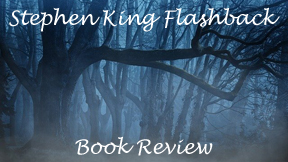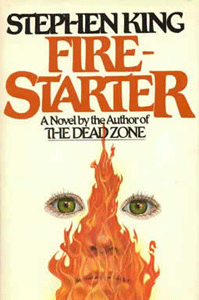Stephen King’s direct connection to “The X-Files” consists of only one episode he co-wrote, Season 5’s “Chinga.” But his 1980 novel “Firestarter” is a precursor to two “X-Files” characters. Cecil L’Ively can start fires with his mind in Season 1’s “Fire,” and Robert Patrick Modell can influence people’s behavior in Season 3’s “Pusher” and Season 5’s “Kitsunegari.”
The price of powers
As good as those episodes are, though, they are mostly about the X-File of it: the weirdness of the phenomenon. At nearly 500 pages, “Firestarter” is a deeper work. Certainly, King has a raw interest in pyrokinesis (as exhibited by 8-year-old Charlie McGee) and mind control (as exhibited by her father, Andy). But the book is more about what these powers mean for the McGees – internally and externally.
On the “external” side, “Firestarter” is a stealth critique of big governments. The book is never lecture-y, but King – inspired by real-life accounts of the USA and USSR experimenting on citizens — paints a detailed picture of how The Shop can get away with this, and why its employees do horrible things. The answer is chillingly mundane: It’s their job, and they don’t want to lose it.

“Firestarter” (1980)
Author: Stephen King
Genre: Science fiction
Setting: New York, Vermont and Virginia, 1980
That especially applies to “Cap” Hollister, the leader of the experiments on the McGees, who for much of the book are held captive at a rural Virginia facility that calls to mind the “X-Men” TV series “The Gifted.”
But the most fascinating villain is John Rainbird, an assassin who poses as a low-level orderly and gains Charlie’s trust. His end goal is to watch the life leave her eyes. He sees this action as the greatest form of love in this cruel world.
Father-daughter bond
In a more traditional version of love, we have a sweet father-daughter bond. At first, “Firestarter” has a depressingly fatalistic vibe. Andy and Charlie are destined to be caught by pursuers from The Shop. King intersperses this with flashbacks to Vicky (Andy’s wife, Charlie’s mom) being murdered. She came out of the Lot Six experiments without powers and is therefore a loose end.
Yet “Firestarter” counterbalances governmental evil with basic human goodness when an upstate New York farmer and his wife, Irv and Norma Manders, shelter the McGees.
I assumed Charlie unleashing of her full fury would mark the book’s grand finale. So I was impressed that King gives us the expected fire-ridden set piece fairly early on. He delights in describing objects – and sometimes people – being burned up, but he also gives us Charlie’s emotions. She hates creating conflagrations, but worse yet, she sometimes loves it.
For Andy, the price is physical. Numb spots form on his face whenever he pushes someone’s mind too hard; he knows the use of his power will eventually lead to his death.

Slow burn
You might call the section at The Shop’s facility a “slow burn,” as the agents try to run experiments and Charlie and Andy try to refuse. But I didn’t know precisely where the action would go, so the novel is simultaneously procedural and unpredictable.
The wild card Rainbird is a big reason for this. But naturally, Charlie is the main character. Like any 8-year-old, she keeps people on their toes, but this one can also create fire and has been separated from her father and mistreated and manipulated. Anything can happen.
The epilog is almost like a sequel. We can see the page count nearing its end, but King gives us a peek at what happens next. It’s both a rushed and gripping wrap-up.
One weakness is that King does a pseudo-Crichtonian thing of giving The Shop predictive computer programs. They give odds of what Charlie and Andy will do. But the author doesn’t back this up with any explanation of how the program works. When placed against the detailed descriptions of other things, this is a shaky and unnecessary element.
Always about the people
“Firestarter” isn’t quite as poetic as King’s later elite works. But it stands as one of his great early novels where he illustrates that horror is horrific not merely because of raw facts (that fire can burn and kill) but because of how horror affects people’s psyches.
One could argue King could’ve teased out more parallels between the superpower and the initially uncontrolled new experiences every kid has. Maybe he could’ve been more ironic about how even the world’s entrenched structures view girls and women and mysterious. Then again, maybe it’s best to let essayists and King nerds explore these subliminal aspects.
On the surface, “Firestarter” sparks because King never wavers from its heart — an 8-year-old girl dealing with pyrokinesis in an uncaring environment — nor does the reader. While the surrounding characters are scared of Charlie, we remain scared for her.
On Fridays, RFMC reviews a Stephen King book, adaptation or related work. Click here to visit our Stephen King Zone.

